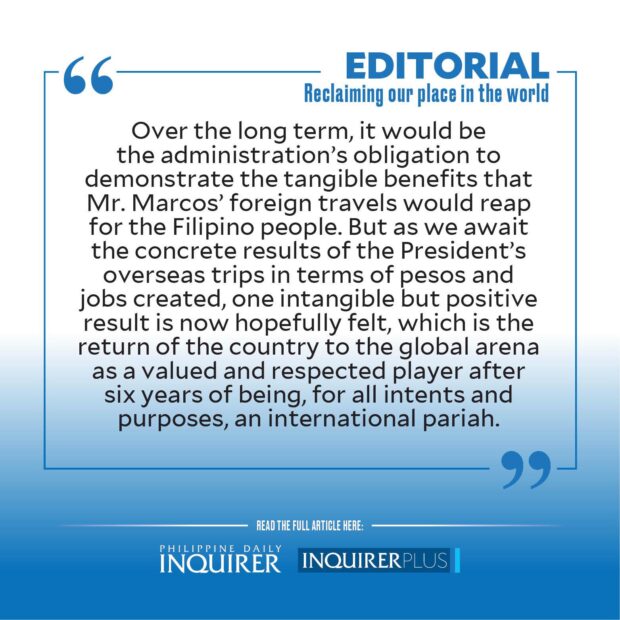
The situation is compounded by the challenges at home that the Philippines continues to face, not least of which is the lingering high inflation rate that despite a clear downtrend of late, still erodes the value of the Filipinos’ hard-earned money month after month. Add to that regular water interruptions in some parts of Metro Manila and rotating power blackouts in Mindoro, both of which could be precursors of worse shortages in the near future. One could then be forgiven for thinking that the President should just stay home and devote his time and effort to solving these intractable and perennial problems.
There is no debate that the President should address the pressing domestic problems. There is also no debate that these foreign trips should not be ostentatious and not include hangers-on and opportunists wasting precious public resources.
But the job of leading a nation is a multifaceted one and cannot be defined by domestic concerns alone. In the interconnected world of today, making sure that Filipinos can afford to put food on the table also means keeping local farms going, by getting enough imported fertilizer whose supply was disrupted by Russia’s invasion of Ukraine. Making sure that Filipinos enjoy uninterrupted water and power supply means improving relations with foreign governments who can provide billions of dollars in financing for the dams that need to be built, and maintaining ties with world leaders who can help ensure the continued supply of fuel for our power plants. Ensuring jobs for more Filipinos means helping boost investor confidence by meeting business leaders overseas and persuading them to invest in our country. Taking care of overseas Filipino workers means meeting with leaders of host countries who can safeguard their rights and ensure optimal working conditions.
The Philippines must also—through the actions and words of its leader—make clear to the rest of the world where we stand on issues of global importance. These concerns range from protecting the national interest in regional maritime conflicts such as that we currently face with China, to lending our weight to embattled democracies half a world away that are being threatened by authoritarian neighbors. It is one thing to issue statements of support from the comfort of Malacañang, but another thing altogether to fly to a different time zone and assert the country’s stand in person with the pressure of a firm handshake and a steely gaze into another leader’s eyes. The former meets the basic requirement of being a country’s head of state, while the latter conveys to the rest of the world that we are serious about our place in it.
Indeed, one could say that on top of solving the nation’s problems, Mr. Marcos should also contribute to untangling the challenges that the Philippines currently faces within our region and in the broader world. As it is, the President’s foreign travels—especially those where he meets with fellow heads of state or represents the country in global summits and conferences—are encouraging indications that the Philippines’ image on the international stage is on the mend after six years under a leader who not only shunned such invitations but trashed the country’s image abroad by heaping verbal abuse on some international personalities.
No doubt, it is tempting to look inward and demand that Mr. Marcos cease “wasting taxpayer money” on these foreign trips, given the many problems at home. But this one-dimensional view—a relic of the 20th century—must be replaced with a broader worldview that appreciates the country’s important place in the community of nations. Given the political divide the country is currently experiencing, there would clearly be no satisfying the President’s critics over the short term.
Over the long term, however, it would be the administration’s obligation to demonstrate the tangible benefits that Mr. Marcos’ foreign travels would reap for the Filipino people. But as we await the concrete results of the President’s overseas trips in terms of pesos and jobs created, one intangible but positive result is now hopefully felt, which is the return of the country to the global arena as a valued and respected player after six years of being, for all intents and purposes, an international pariah.

